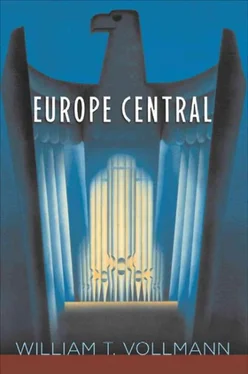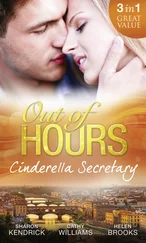628 Comrade Alexandrov’s assessment: “A young, pretty blond woman with gentle brown eyes and a good figure”—Actually, G. Glikman (1945), in Schmalenberg, p. 182 (trans. by WTV). The Shostakoviches had at this time been married for over a decade.
630 Comrade Luria: “As stillborn as a law without the seal of Heaven on it…”—This and other aspects of the Jewish creed based on the texts and commentaries in Jacob Neusner, Introduction to Rabbinic Literature (New York: Doubleday, 1994).
631 Comrade Alexandrov’s note: “Only eight percent of Leningrad’s housing was destroyed” —Figure from Werth, Leningrad, p. 43.
632 Shostakovich to Schwartz: “What I’ve heard is better than anything by Shostakovich!” —Loosely after G. Glikman, in Schmalenberg, p. 199 (trans. by WTV).
634 Description of Shostakovich in 1948—After the illustration in Gojowy, p. 81 (“Im Zebtrum des Kulturkampfes 1948…”).
635 The poster of Shostakovich in the copper helmet; Gavriil’s reaction to it and his sculpture —G. Glikman, Ibid., pp. 179-80.
637 Shostakovich: “Certain negative characteristics in my musical style prevented me from reconstructing myself”— New Grove Dictionary of Music and Musicians, ed. Stanley Sadie (Washington, D.C.: Macmillan Publishing Ltd., 1980), vol. 17, p. 265 (entry on Shostakovich, slightly reworded).
637 Description of Galya Shostakovich as a girl—After the illustration in Gojowy, p. 29 (“Dimitri Schostakowitsch mit seiner Tochter Galina”).
638 Akhmatova’s denunciation in Leningradskaya Pravda —Reeder, p. 296.
640 “Comrade Hitler”: “Conscience is a Jewish creation”—The Auschwitz-Birkenau State Museum in Oswiecim , p. 145 (Francizek Piper, “Living Conditions as Methods of Extermination,” quotation from H. Rauschning’s Gespräche mit Hitler).
640 Khrennikov on Shostakovich: “Alien to the Soviet people”—MacDonald, p. 192.
640 Footnote: Great Soviet Encyclopedia remarks on the Allied Control Council—Vol. 13, p. 7, entry for same (slightly modified for context).
641 Shostakovich’s doublespeak to the activists: “I appreciate your valuable critical observations… I’m sure those sanctions will, mmm, to speak, inspire me to… future creative work and provide, er, insights … Rather than take a step backward I shall take a step, so to speak, forward”—Glikman, p. 27 (letter of 8 December 1943, meant sarcastically in original, further Shostakovich-ized by WTV).
645 Shostakovich to Ustvolskaya: “Illusions don’t die all at once—”—Loosely after Shostakovich and Volkov, p. 85.
645 Completion date of Ustvolskaya’s Sonata No. 2—February is my interpolation. I know only that it bears the date 1949.
645 Comrade Stalin: “We’ll take care of that problem, Comrade Shostakovich”—Shostakovich and Volkov, p. 148.
647 Marina Tsevtaeva (“in anger and in love”): “I refuse to be”—Op. cit., p. 122 (from “Poems to Czechoslovakia”).
648 Shostakovich: “I do not like too friendly or too antagonistic relationships between people.”—After Khentova (Mineyev); original p. 152, Mineyev, p. 18.
650 Shostakovich to Glikman: “Everything is so fine, so perfectly excellent, that I can find almost nothing to write about”—Glikman, p. 39 (letter of 2 February 1950; this would actually have been written five months before Shostakovich had gone to East Germany, but it’s a typical Shostakovich-ism. Glikman notes that whenever his friend wrote such things, he generally meant or at least felt the opposite).
651 Devotee of white keys and black keys: “This typical Russian girl, with her two braids…”—Dmitry Paperno, Notes of a Moscow Pianist (Portland, Oregon: Amadeus Press, 1998), p. 199.
654 S. Skrebov: “I absolutely reject such music…”—Wilson, p. 251 (testimony of Lyubov’ Rudneva, slightly altered).
658 Great Soviet Encyclopedia on God: “An imaginary figure of a powerful supernatural being.” —Vol. 3, entry on God.
660 Shostakovich to Glikman: “Dear Isaak Davidovich…”—Glikman, p. 49 (29 August 1953).
670 Shostakovich to Nikolayeva: “Which of them was luckier?”—After Shostakovich and Volkov, p. 98 (here Shostakovich was actually comparing himself to the executed Tukhachevsky).
670 Shostakovich to Nikolayeva: “Well, to grieve is also a right, but it’s not granted to everyone!”—After Shostakovich and Volkov, p. 136.
670 Shostakovich: “It was really terrible that he didn’t have a secretary. It used to be that Nina always picked up the telephone and said that he was away for two months”—After Gojowy, p. 106 (DDS to Denisov, trans. by WTV).
670 Chekhov: “Isn’t our living in town…” — Anton Chekhov, The Tales of Chekhov, vol. 5: “The Wife” & Other Stories, trans. Constance Garnett (New York: Ecco Press, 1985 repr. of 1918 Macmillan ed.), p. 267 (“The Man in a Case,” 1898), abridged by WTV.
671 The difference between a whistling shell and a sizzling one—Werth, p. 55.
672 The émigré Martynov on “Lady Macbeth”: “A warning of harmful deviation.”—Ivan Martynov, Dmitri Shostakovich: The Man and His Work, trans. T. Guralsky (New York: Philosophical Library, 1947), p. 47.
673 Discussion with Comrades Khubov et al about “Lady Macbeth”—Loosely based on the account in Glikman, pp. 261-62.
674 “It’s about, I, I, how the love could have been if the world weren’t full of vile things…”—After Shostakovich and Volkov, p. 108 (the composer was actually speaking of “Lady Macbeth”).
674 Shostakovich’s song: “Burn, candle, burn bright, in Lenin’s little red asshole” —G. Glikman, in Schmalenberg, p. 197 (trans. and slightly altered by WTV).
674 The Eleventh Symphony’s “secret references to the Soviet tanks now crushing the Hungarian uprising”—After Wilson, p. 317 (testimony of Lev Lebedinsky: “What we heard in this music was not the police firing on the crowd in front of the Winter Palace in 1905, but the Soviet tanks roaring in the streets of Budapest”).
674 Maxim: “Papa, what if they hang you for this?”—Loc. cit.
675 “A German”: “The Russians are masters in the construction of shellproof wooden field fortifications.”—Steven H. Newton, comp., German Battle Tactics on the Russian Front 1941-1945 (Atglen, Pennsylvania: Schiffer Military/Aviation History, 1994), p. 127 (Gustav Höhne, “In Snow and Mud: 31 Days of Attack Under Seydlitz During Early Spring of 1942”).
675 Shostakovich: “When I look back on my life, I realize that I’ve been a coward…” —After Wilson, p. 304 (testimony of Edik Denisov). For narrative reasons I have moved this scene from 1957, when it actually occurred, to 1958.
675 Address of the Kino House (Dom Kino)—Dr. Heinrich E. Schulz and Dr. Stephen S. Taylor, Who’s Who in the USSR 1961/62 (Montreal: Intercontinental Book and Publishing Co., Ltd, 1962; printed in Austria; orig. comp. by Institute for the Study of the USSR, Munich), p. 320 (entry on Karmen). Let’s hope that the Kino House was in the same place in 1958.
680 Khrushchev and Shostakovich, 1960: Based on a scene described in Wilson, pp. 381-82 (testimony of Sergei Slonimsky).
681 Shostakovich to Glikman: “Life is far from easy. How I long…”—Glikman, p. 90 (letter of 30 April 1960).
681 Glikman’s secret approach to Elena Konstantinovskaya on Shostakovich’s behalf —This is a total fiction.
681 Number of faculty members at the Leningrad Conservatory— Great Soviet Encyclopedia, vol 14, p. 396 (entry on Leningrad Conservatory). Since this is a 1972-73 figure, it might be slightly higher than would have been the case a decade earlier.
Читать дальше












